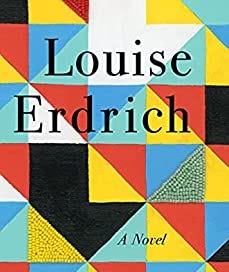I’m on a plane leaving New Orleans in the cool white heat of an early morning. The city is on Central Time and my mind is still on Eastern Time before Daylight Savings time, though DST has already occurred.
It’s too short a flight to dig out the laptop and plunder the depths of my headspace for a few measly sentences inserted my novel’s rewrite. Instead, I settle into my seat and open Kindle on my phone to read.
I’m working on Louise Erdrich’s The Sentence. Its title captivates me. All books can be contained in a single sentence. It’s one of the first idioms taught in Writing or Publishing 101: how to describe your unique selling proposition in one sentence. The standard formula is when A meets/happens to/kills/occurs to B, then C.
The description of the novel reads, “Tookie, who has landed a job selling books after years of incarceration that she survived by reading 'with murderous attention,' must solve the mystery of a bookstore haunting while at the same time trying to understand all that occurs in Minneapolis during a year of grief, astonishment, isolation and furious reckoning.”
We know “Minneapolis” as if it’s a code word. We know the time period of when George Floyd was murdered amidst the backdrop of a raging Covid-19 virus. We know the heartbreak and confusion and anger that followed Minneapolis. We know all that still exists around the violence and the pandemic. And we understand there must be a reckoning not just for Tookie, but for us, the reader. A realigning (not a return to normal) of ourselves with our real lives.
But do we know grief?
The further I swim into Erdrich’s book, I start to sink, weighted down by references to the pandemic and news reports, fake and real, in which we all drowned. My shoulders drop. I haven’t practiced yoga in a week. I’m missing my Monday morning walk. All my selfcare has flown away with the seagull darting outside the window as we ascend. My coping strategies have disappeared along with the ground. I have nothing left to do but to mourn “Minnesota,” and add to that “Wisconsin” in the wake of the Kyle Rittenhouse case and Christmas parade tragedy.
As writer of stories about loss, I am always struck by the ability of fiction to place me where I need to be. It’s not only the magic of books that elicits this feeling, but the magic of the moment and the secret to the universe in recognizing the signs of this need to grieve as we enter into the darkness of December brightened only by the blur of holiday lights.
My husband sits next to me, enveloped in a movie called Finch, set in a post-apocalyptic world, and I can’t help but see the similarities in that world and now, without being morose.
The words I’ve written about the pandemic times number in the tens of thousands. None succinctly and emotionally tread across the totality of the experience as Louise wrote in The Sentence.
Though the definite article along with the singular noun refer to a specific sentence at the heart of the plot, we don’t even realize the sentence also alludes to punishment, as in how one sentence condemns us to live out the harshness of our lives. But no phrase succinctly sum up what’s next for us, other than how Louise concludes her book, again with one sentence (I am lying. There are two).
While still in New Orleans, I shared my heart app stats to my daughter, laughing at the number of miles my husband and I had walked that morning. Out of curiosity, I scrolled through the bar graph from the previous year, 2020. The highest bar, meaning the greatest average number of miles I walked, occurred in April of 2020. At the time, I was pushing through the grief of post-accident trauma and recovery from bruises and broken bones. Like everyone else, I was also squirming my way through the pandemic, lack of physical contact with our kids, our friends. Those many, many weeks felt like a sentence we were all condemned to serve, to this day. I hit the next highest average in March of this year, the month of my first vaccination.
“Walking is a feat of controlled falling,” Louise Erdrich writes. I’ve walked for months covering the distance required to evade the occasional tears, fearful of cascading into the gloom. Finally, a book tells me it’s time to stop, drop, and let myself feel this deep need to grieve.




